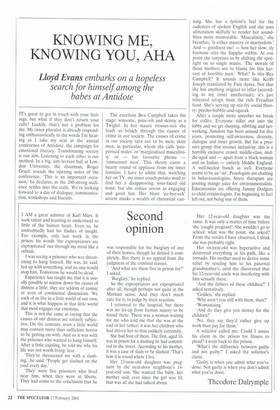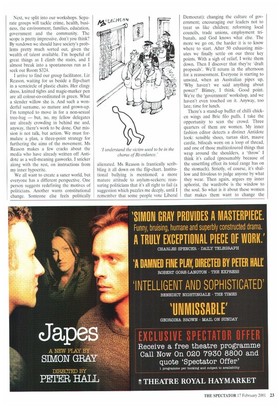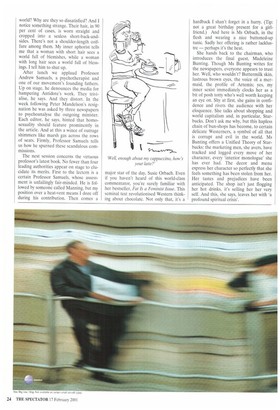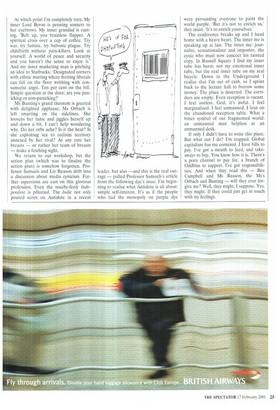Second opinion
I AM a great admirer of Karl Marx. It took talent and learning to understand so little of the human heart. Even so, he undoubtedly had his flashes of insight. For example, only last week in the prison, his words 'the expropriators are expropriated' ran through my mind like a refrain.
I was seeing a prisoner who was threatening to hang himself. He was, he said, fed up with everything, and no one would stop him. Tomorrow he would be dead.
Experience has taught me that it is usually possible to narrow down the causes of distress a little: they are seldom of cosmic or even of continental dimensions. We each of us live in a little world of our own, and it is what happens in that little world that most engages our emotions.
This is not the same as saying that the causes of our distress are entirely subjective. On the contrary, even a little world may contain more than sufficient horror to be getting on with. And so it was with the prisoner who wanted to hang himself. After a little cajoling, he told me why his life was not worth living: fear.
'They've threatened me with a slashing,' he said. 'People get slashed on the yard every day.'
'They' were five prisoners who lived near him, when they were at liberty. They had come to the conclusion that he was responsible for the burglary of one of their homes, though he denied it completely. But there is no appeal from the judgment of the criminal classes.
And what are these five in prison for?' I asked.
'Burglary,' he replied.
So the expropriators are expropriated after all, though perhaps not quite in the Marxian sense. And they don't much care for it, to judge by their reaction.
I returned to the hospital, but there was no let-up from human misery to be found there. There was a woman waiting for me who told me that she was at the end of her tether; it was her children who had driven her to that unlikely extremity.
She had four of them. The first, aged 16, was in prison for a slashing he had committed in the street. According to his mother, it was a case of slash or be slashed: 'That's how it is round where I live.'
Her 13-year-old daughter was pregnant by the next-door neighbour's 14year-old son. She wanted the baby, her mother said; ever since the girl was 10, that was all she had talked about. Her 12-year-old daughter was the same. It was only a matter of time before she 'caught pregnant'. She wouldn't go to school: what was the point, she asked? From the results I have observed, I think she was probably right.
Her six-year-old was hyperactive and destroyed everything in his path, like a tornado. His mother used to derive some relief by sending him to his paternal grandmother's, until she discovered that his 12-year-old uncle was interfering with him sexually there.
'And the fathers of these children?' I asked tentatively.
'Golden,' she replied.
'Why aren't you still with them, then?' 'Womanising.'
'And do they give you money for the children?'
'No, they say they'd rather give up work than pay for them.'
A solicitor called me. Could I assess his client in the prison for fitness to plead? I went back to the prison.
'What's the difference between guilty and not guilty?' I asked the solicitor's client.
'Guilty is when you admit what you've done. Not guilty is when you don't admit what you've done.'
Theodore Dalrymple
Next, we split into our workshops. Separate groups will tackle crime, health, business, the environment, families, edueation, government and the community. The scope is pretty impressive, don't you think? By sundown we should have society's problems pretty much sorted out, given the wealth of talent available. I'm hopeful of great things as I climb the stairs, and I almost break into a spontaneous run as I seek out Room S324.
I arrive to find our group facilitator, Liz Reason, waiting for us beside a flip-chart in a semicircle of plastic chairs. Her clingy dress, knitted tights and magic-marker pen are all colour-co-ordinated in green. What a slender willow she is. And such a wonderful surname, so mature and grown-up. I'm tempted to move in for a non-sexual tree-hug — but, no, my fellow delegates are already crowding in behind me and, anyway, there's work to be done. Our mission is not talk, but action. We must formulate a plan, a three-point strategy for furthering the aims of the movement. Ms Reason makes a few cracks about the media who have already written off Antidote as a well-meaning gasworks. I snicker along with the rest, on instructions from my inner hypocrite.
We all want to create a saner world, but everyone has a different perspective. One person suggests redefining the motives of politicians. Another wants constitutional change. Sonieone else feels politically alienated. Ms Reason is frantically scribbling it all down on the flip-chart. Institutional bullying is mentioned; a more mature attitude to asylum-seekers; reassuring politicians that it's all right to fail (a suggestion which puzzles me deeply, until I remember that some people vote Liberal Democrat); changing the culture of government; encouraging our leaders not to treat us like children; reforming local councils, trade unions, employment tribunals. and God knows what else. The more we go on, the harder it is to know where to start. After 50 exhausting minutes we finally settle on our three key points. With a sigh of relief, I write them down. Then I discover that they're 'draft proposals'. We'll return in the afternoon for a reassessment. Everyone is starting to unwind, when an Australian pipes up, 'Why haven't we said anything about power?' Blimey, I think. Good point. We're the 'government' workshop, and we haven't even touched on it. Anyway, too late; time for lunch.
There's a stand-up buffet of chilli chicken wings and Brie fib o puffs. I take the opportunity to scan the crowd. Three quarters of them are women. My inner fashion editor detects a distinct Antidote look: sensible shoes, tartan skirt, mauve cardie, bifocals worn on a loop of thread, and one of those multicoloured things that wrap around the shoulders, a 'throw' I think it's called (presumably because of the unsettling effect its tonal range has on the stomach). Strictly, of course, it's shallow and frivolous to judge anyone by what they wear. Then again, argues my inner aphorist, the wardrobe is the window to the soul. So what is it about these women that makes them want to change the
world? Why are they so dissatisfied? And I notice something strange. Their hair, in 90 per cent of cases, is worn straight and cropped into a sexless short-back-andsides. There's not a shoulder-length coiffure among them. My inner aphorist tells me that a woman with short hair sees a world full of blemishes, while a woman with long hair sees a world full of blessings. I tell him to shut up.
After lunch we applaud Professor Andrew Samuels, a psychotherapist and one of our movement's founding fathers. Up on stage, he denounces the media for hampering Antidote's work. They trivialise, he says. And they distort. In the week following Peter Mande!son's resignation he was asked by three newspapers to psychoanalyse the outgoing minister. Each editor, he says, hinted that homosexuality should feature prominently in the article. And at this a wince of outrage shimmers like marsh gas across the rows of seats. Firmly, Professor Samuels tells us how he spurned these scandalous commissions.
The next session concerns the virtuous professor's latest book. No fewer than four leading authorities appear on stage to elucidate its merits. First to the lectern is a certain Professor Samuels, whose assessment is unfailingly fair-minded. He is followed by someone called Manning, but my position over a heat-vent means I doze off during his contribution. Then comes a
major star of the day, Susie Orbach. Even if you haven't heard of this world-class commentator, you're surely familiar with her bestseller, Fat Is a Feminist Issue. This seminal text revolutionised Western thinking about chocolate. Not only that, it's a
hardback I shan't forget in a hurry. (Tip: not a great birthday present for a girlfriend.) And here is Ms Orbach, in the flesh and wearing a nice buttoned-up tunic. Sadly her offering is rather lacklustre — perhaps it's the heat.
She hands back to the chairman, who introduces the final guest, Madeleine Bunting. Though Ms Bunting writes for the newspapers, everyone appears to trust her. Well, who wouldn't? Buttermilk skin, lustrous brown eyes, the voice of a mermaid, the profile of Artemis; yes, my inner sexist immediately clocks her as a bit of posh totty who's well worth keeping an eye on. Shy at first, she gains in confidence and rivets the audience with her eloquence. She talks about shopping and world capitalism and, in particular, Starbucks. Don't ask me why, but this hapless chain of bun-shops has become, to certain delicate Westerners, a symbol of all that is corrupt and evil in the world. Ms Bunting offers a Unified Theory of Starbucks: the marketing men, she avers, have tracked and logged every move of her character, every 'interior monologue' she has ever had. The decor and menu express her character so perfectly that she feels something has been stolen from her. Her tastes and prejudices have been anticipated. The shop isn't just flogging her hot drinks, it's selling her her very self. And this, she says, leaves her with 'a profound spiritual crisis'. At which point I'm completely torn. My inner Lord Byron is penning sonnets to her eyebrows. My inner grandad is ranting, 'Belt up, you brainless flapper. A spiritual crisis over a cup of coffee. Try war, try famine, try bubonic plague. Try childbirth without pain-killers. Look at yourself. A world of peace and security and you haven't the sense to enjoy it.' And my inner marketing man is pitching an idea to Starbucks: 'Designated corners with ethnic matting where fretting liberals can fall on the floor writhing with consumerist angst. Ten per cent on the bill. Simple question at the door: are you panicking or non-panicking?'
Ms Bunting's grand theorem is greeted with delighted applause; Ms Orbach is left smarting on the sidelines. She loosens her tunic and jiggles herself up and down a bit. I can't help wondering why. Do her orbs ache? Is it the heat? Is she exploiting sex to reclaim territory annexed by her rival? At any rate her breasts — or rather her team of breasts — make a fetching sight.
We return to our workshop, but the action plan (which was to finalise the action plan) is somehow forgotten. Professor Samuels and Liz Reason drift into a discussion about media cynicism. Further aspersions are cast on this glorious profession. Even the touchy-feely Independent is pilloried. The Indic' not only poured scorn on Antidote in a recent
leader, but also —and this is the real outrage — pulled Professor Samuels's article from the following day's issue. I'm beginning to realise what Antidote is all about: simple self-interest. It's as if the people who had the monopoly on purple dye were persuading everyone to paint the world purple. 'But it's not to enrich us,' they insist. 'It's to enrich yourselves.'
The conference breaks up and I head home with a heavy heart. The inner me is speaking up at last. The inner me: journalist, sensationaliser and impostor, the cynic who must now concoct his tainted copy. In Russell Square I find my inner tube has burst; not my emotional inner tube, but the real inner tube on my real bicycle. Down in the Underground I realise that I'm out of cash, so I sprint back to the lecture hall to borrow some money. The place is deserted. The corridors are empty. Even reception is vacant. I feel useless. God. it's awful. I feel marginalised. I feel unmanned. I lean on the abandoned reception table. What a bitter symbol of our fragmented world: an unmanned man helpless at an unmanned desk.
If only I didn't have to write this piece. But what can I do? I'm trapped. Global capitalism has me cornered. I have bills to pay. I've got a mouth to feed, and takeaways to buy. You know how it is. There's a porn channel to pay for, a branch of Oddbins to support. I've got responsibilities. And when they read this — Bea Campbell and Ms Reason, the Ms's Orbach and Bunting — will they ever forgive me? Well, they might, I suppose. Yes, they might. If they could just get in touch with my feelings.





































































 Previous page
Previous page